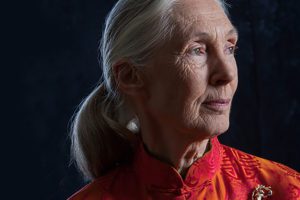Jane Goodall is a pioneer in the field of primatology who has led the fight for better understanding of animals for over half a century. When Goodall set out in 1960 to study chimpanzees in Tanzania, she was untrained in scientific methods but was well armed in empathy and understanding. Using her intuitive approach to studying animals and their behavior, Goodall was able to prove that humans must relate to animals as living beings, reaching out with our heart as well as our minds.

Jane Goodall
Jane was criticized by scientists who accused her of incorrectly performing her work. Chimpanzees do not have emotions, they argued. Only humans were capable of having feelings. She should not name the chimps, but refer to them by number, keeping the work objective and free of emotion. Goodall disagreed and refused to be discouraged or intimidated by those with more formal education. She trusted her own understanding of the chimpanzees from spending hours observing and interacting with them.
Today, Jane Goodall is world renowned as an animal activist and innovator in animal study. Her life’s work has demonstrated that animals do, in fact, have feelings and emotion, a truth that many pet owners needed no convincing of. Goodall has become a leader by example with her refusal to back down when criticized and her courage to stand up for what she believes is right.
The Jane Goodall Institute continues her work in many areas. The organization, led by Goodall, protests animal testing and abuse, encourages ecologically friendly education and preservation, and encourages greater understanding and appreciation of the animal kingdom. With goals that are global in their reach, JGI does not back down from a challenge any more than Jane Goodall did herself.
Jane also founded Roots & Shoots, an organization dedicated to educating the next generation about the importance of conservation efforts. In speaking about the importance of this initiative, Jane said, “There’s no point in struggling to save chimpanzees and rain forests if we’re not raising young people to do a better job than we’ve done. They can do a better job. They’re doing it already. And so my hope is very much vested with them.”
Above all, Jane believes that we must not look at animals or other people from a purely factual basis. “Only when our clever brain and our human heart work together in harmony can we achieve our true potential.”

